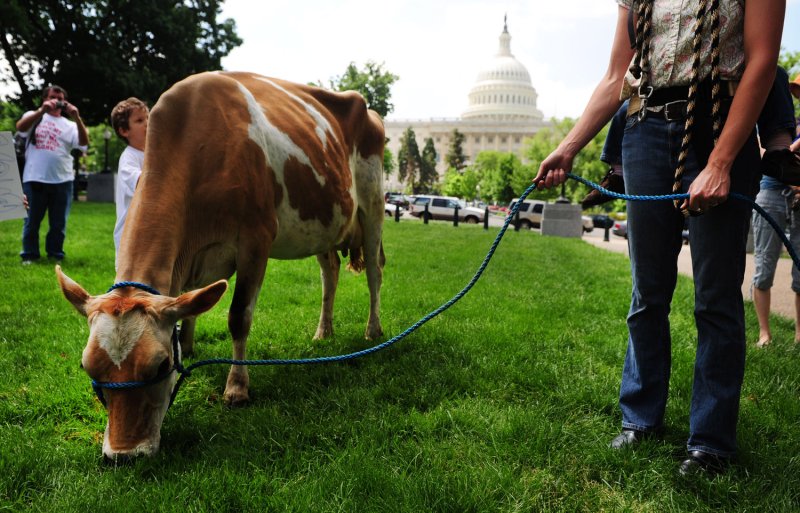Pediatricians urge eating only pasteurized dairy products.
A dairy cow grazes on Capitol Hill during a rally protesting the Food and Drug Administration's recent actions against traditional dairy farmers in Washington on May 16, 2011. Farmers and supporters rallied to show support for raw milk farmers. UPI/Kevin Dietsch |
License Photo
STANFORD, Calif., Dec. 16 (UPI) -- U.S. pregnant women, infants and young children should avoid raw or unpasteurized milk and milk products and only eat pasteurized products, pediatricians say.
A policy statement from the American Academy of Pediatrics says raw milk and milk products from cows, goats or sheep are a continuing source of bacterial infections that are especially dangerous to pregnant women, fetuses, the elderly, young children and people with compromised immune systems.
Lead author Dr. Yvonne Maldonado, professor of pediatrics at the Stanford University School of Medicine, says the popularity of raw milk and raw-milk products, such as soft cheeses, has been growing in recent years, in part due to claims of health benefits. But those health claims have not been backed up by science, Maldonado says.
The academy's policy statement, published in the journal Pediatrics, endorses a nationwide ban on the sale of raw or unpasteurized milk and milk products, including raw-milk cheeses that have been aged for more than 60 days.
In endorsing a raw-milk cheese ban, the statement cited scientific evidence that E. coli 0157, a pathogenic strain of the E. coli bacteria that can cause particularly severe symptoms and in some cases liver failure, can survive in raw-milk cheese even after 60 days of aging and has been linked to E. coli outbreaks.
Studies have shown repeatedly that raw milk and pasteurized milk contain equivalent levels of nutrients, such as proteins, carbohydrates, calcium, vitamins and enzymes. Claims that raw milk is not associated with lactose intolerance have not been substantiated by independent studies, Maldonado says.
"We have no scientific evidence that consuming raw milk provides any advantages over pasteurized milk and milk products," Maldonado, an infectious disease expert who also is a pediatrician at Lucile Packard Children's Hospital, says in a statement.
"But relative to the amount of raw-milk products on the market, we do see a disproportionately large number of diseases and illnesses from raw milk."
From 1998 to 2009, there were 93 recorded outbreaks of disease resulting from consumption of raw milk or raw-milk products, causing 1,837 illnesses, 195 hospitalizations and two deaths, Maldonado says.
Most of the illnesses were caused by contamination of the product with E. coli or with species of Salmonella or Campylobacter -- all foodborne pathogens. Infections by such bacteria can cause diarrhea, fever, cramps, nausea and vomiting.















